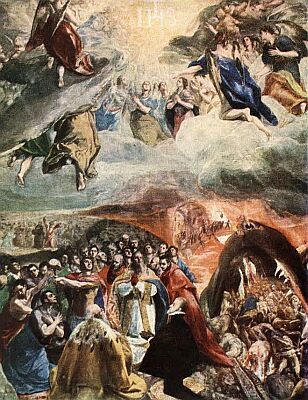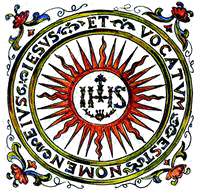From: Hebrews 2:5-12
Jesus, Man’s Brother, was Crowned with Glory and Honor Above the Angel
[5] For it was not to angels that God subjected the world to come, of which we
are speaking. [6] It has been testified somewhere, “What is man that thou art
mindful of him, or the son of man, that thou carest for him? [7] Thou didst make
him for a little while lower than the angels, thou hast crowned him with glory and
honor, [8] putting everything in subjection under his feet.” Now in putting every-
thing in subjection to him, he left nothing outside his control. As it is, we do not
yet see everything in subjection to him. [9] But we see Jesus, who for a little
while was made lower than the angels, crowned with glory and honor because
of the suffering of death, so that by the grace of God he might taste death for
every one.
[10] For it was fitting that he, for whom and by whom all things exist, in bringing
many sons to glory should make the pioneer of their salvation perfect through
suffering. [11] For he who sanctifies and those who are sanctified have all one
origin. That is why he is not ashamed to call them brethren, [12] saying. “I will
proclaim thy name to thy brethren, in the midst of the congregation I will praise
thee.”
*********************************************************************************************
Commentary:
5-9. The saving dimension of the Incarnation is being explored here with the
help of quotations from Psalm 2 and other psalms. Christians should stay true
to Christ, because in addition to his being the cause and beginning of salvation
he has been made Lord of the universe; everything is subject to him. God the
Father, in other words, has established Christ—not the angels—as Lord of “the
world to come”.
God has put everything under Christ as man. The words of Psalm 8 are quoted
as applying to Christ as man, for he is the perfection of manhood, the perfect
man, and he merited being crowned with glory and honor because of his obe-
dience, humility, and passion and death (cf. Phil 2:6-11; 1 Pet 2:21-25); even
death itself has become subject to him (cf. 1 Cor 15:22-28). His enemies have
been made his footstool (cf. Ps 8:6; 110:1; Mt 22:44); he will channel every-
thing back to God, and God will be all in all.
5. “The world to come” was a term the Jews used to refer to the period immedia-
tely following the coming of the Messiah. The rabbis distinguished three periods
in the history of the world—the “present world”, the time when they were waiting
for the Messiah; the “day of the Messiah”, the point at which his kingdom would
be established; and the “world to come”, which would begin with the Resurrec-
tion of the dead and the judging of the nations. Many teachers of the Law tended
to confuse the “world to come” in some way with the “day of the Messiah”, which
was its initial stage.
The author of the epistle seems to be saying that the government of the present
world is entrusted by God to angels (cf. Deut 32:8; Dan 10: 13f), but that in the
world to come that is, in the definitive Kingdom—God the Creator’s original plan
will be implemented: Christ, true God and true man, with his glorified manhood,
will be the King of Creation and the holy angels and the blessed will reign with
him. The “world to come”, although it has begun with the Resurrection and glo-
rification of Jesus, will not reach its fullness until the second coming of Christ
and the resurrection of the dead. Until then, there exists a tension between “this
world” and the “world to come”: the former has received a mortal wound but it is
still alive; the latter has begun to exist but it has not yet attained its final full ex-
pression.
6. Psalm 8 is a hymn praising God for creating all things; particularly man,
whom he has made master of all creation. The words of the Psalm quoted here
are those which praise God’s caring love, as shown by his making man, despite
his limitations, lord of Creation.
However, the text of the epistle shows us that the words of the Psalm have a
deeper meaning: they refer to Jesus (cf. 1 Cor 15:27; Eph 1:22) and particularly
to his degradation. “Although these words can be applied to every man,” St John
Chrysostom comments “they do however most properly apply to Christ. For the
words ‘thou hast put everything in subjection under his feet’ (v. 8) are more suita-
ble to him than to us, for the Son of God visited us who were of no account and
having taken and loved our condition, he became higher than us all” (”Hom. on
Heb.”, 4).
The author of Hebrews uses Psalm 8 to demonstrate Christ’s superiority over
angels by giving it a deeply messianic interpretation. Thus, the man “crowned
with glory and honor” is the risen Christ, now seated at the right hand of the
Father; and the one to whom everything has been subjected is also the same
Christ (cf. 1:13), as St Paul proclaims in 1 Cor 15:27; Eph 1:22; Phil 3:21.
8. In keeping with its application to Christ of the words of Psalm 8: 4-6, the
epistle says that God the Father has subjected everything to him. This does not
mean that there is inequality or difference in power or nature between Father and
Son, as if the Son himself were subject to the Father, and the Father had given
him, as he would a subordinate, authority over the world. “Arius argued in this
way,” writes St Thomas: “the Father subjected everything to the Son; therefore,
the Son is less than the Father. I reply that it is true that the Father subjected
everything to the Son according to his human nature, in respect of which he is
less than the Father, as St John says, ‘the Father is greater than I’ (14:28). But
according to his divine nature, Christ himself subjected all things to himself”
(”Commentary on Heb.”, 2, 2).
Christ’s dominion over the universe is something which men cannot see and it
will not become manifest until his second coming as Lord and Judge of the living
and the dead. “Christ, true God and true man, lives and reigns. He is the Lord of
the universe. Everything that lives is kept in existence only through him. Why,
then, does he not appear to us in all his glory? Because his kingdom is ‘not of
this world’ (Jn 18:36), though it is in this world [...]. Those who expected the
Messiah to have visible temporal power were mistaken. [...] When Christ began
to preach on earth he did not put forward a political program. He said, ‘Repent,
for the kingdom of God is at hand’ (Mt 3:2; 4:17). He commissioned his disciples
to proclaim this good news (cf. Lk 10:9) and he taught them to pray for the co-
ming of the Kingdom (cf. Mt 6:10)” (St. J. Escriva, “Christ Is Passing By”, 180).
9. The words “who for a little while was made lower than the angels” refer to
Jesus in the crisis of his Passion and Death, when he freely humbled himself
and lowered himself to suffer punishment and death — sufferings to which angels
are not subject.
“For a little while” is a translation of the Greek word which the New Vulgate ren-
ders as “paulo minus” (a little less than), and which also occurs in Hebrews 2:7
in the quotation from Psalm 8. The RSV translation in both instances is “for a
little while”.
Every human creature, including Christ as man, can be seen in some sense as
lower than the angels. This inferiority basically has to do with the fact that human
knowledge is inferior to that of angels because it is dependent on sense exper-
ience, and also because angels cannot experience suffering and death. “The an-
gels cannot suffer and are immortal by nature, so that when Christ deigned to
submit to his passion and death he made himself lower than them, not because
he lost his sublimity or in any way was diminished, but because he took on our
weakness. He made himself lower than the angels, not as far as his divinity or
his soul were concerned but only in respect of his body” (”Commentary on Heb.”,
2, 2).
Christ’s self-abasement is a permanent example to us to strive to respond to his
love. St John Chrysostom suggests that we draw from it this practical lesson: “If
he whom the angels worship consented, out of love for us, to become for a time
lower than them, you for your part should endure everything out of love for him”
(”Hom. on Heb.”, 4).
One of the results of Christ’s passion was his exaltation and glorification. Be-
cause Christ attained victory on the Cross, to the benefit of all mankind, the Cross
is the only route to heaven: “The holy cross is shining upon us”, the Church says.
“In the cross is victory, in the cross is power. By the cross every sin is overcome”
(”Liturgy of the Hours”, Exaltation of the Cross, Morning Prayer, Ant. 3). But virtue
of Christ’s passion, the Cross is no longer an ignominious scaffold; it is a glorious
throne. Tradition attributes to St Andrew the Apostle these words in praise of the
cross on which he was going to die: “O goodly Cross, glorified by the limbs of our
Lord, O Cross so long desired, so ardently loved, so tirelessly sought and now
offered to me: take me to my Master so that he who redeemed me through thee,
may welcome me through thee” (”Ex Passione S. Andreae”, Reading).
Through his death, Christ has been crowned with glory and honor; moreover he
has died on our behalf. His death and glorification are the cause and model of our
salvation and glorification. Sacrifice, atonement and merit are indissolubly linked
to the redemptive work of Christ and constitute a “grace of God”, that is, a gratui-
tous gift from God. St Thomas Aquinas explains that “the passion of Christ is
here alluded to in three ways. Firstly, its cause is referred to, for the text says
‘by the grace of God’; then, its usefulness, when it says ‘for every one’; thirdly, its
outcome, when it says ‘might taste”’ (”Commentary on Heb.”, 2, 3): Jesus did in-
deed, by the will of the Father, experience or “taste” death. His death is de-
scribed as being like a bitter drink which he chose to take in sips, as if savoring
it. The “cup” or chalice of the agony in the garden comes immediately to mind
(cf. Mt 26:39; Mk 14:26; Lk 22:42; In 18:11; cf. also Mt 20:22f and Mk 10:38f).
Christian tradition has seen these words about “tasting death” as underlining
that Christ underwent a most severe passion voluntarily, accepting it to atone for
all the sins of mankind. These words also show that he accepted death without
ceasing to be Lord of life: “This expression”, St John Chrysostom states, “is very
precise. It does not say ‘that by the grace of God he might die’, for the Lord once
he tasted death delayed there only for a moment and immediately rose [...]. All
men fear death; therefore, to enable us to take death in our stride, he tasted
death even though it was not necessary for him to do so” (”Hom. on Heb.”, 4).
10. After pointing to the results of Christ’s death, the text stresses how appro-
priate it was that he should be abased in this way: he had to make himself in
every way like his brethren in order to help them.
God the Father, who is the beginning and end of all things, desired to bring men
to glory by means of his Son. Christ was to be the author of their salvation and
therefore it was fitting that he should be made perfect through suffering. The Fa-
ther made his Son “perfect” in the sense that by becoming man and therefore
being able to suffer and die, he was fully equipped to be mankind’s representative.
“God has acted in a manner in keeping with his kindness towards us: he has
clothed his first-born in a glory greater than that of all mankind and made him
outstanding as a champion. Suffering is, therefore, a way to attain perfection and
a source of salvation” (”Hom. on Heb.”, 4). By perfectly obeying his Father, of-
fering his life and especially his passion and death, Christ offers a perfect and
superabundant sacrifice for the forgiveness of the sins of mankind and makes full
atonement to the Father. As a reward for his obedience, Christ, as man, is made
Head of the Church and King of the universe. It is in that sense that he is made
“perfect” by the Father.
Ever since the Redemption, human suffering has become a way to perfection: it
acts as expiation for personal sins, it spurs man to assert his spiritual and trans-
cendental dimension, it makes for solidarity with others and links man to Christ’s
sacrifice. “Suffering must serve for conversion, that is, for the rebuilding of good-
ness in the subject, who can recognize the divine mercy in this call to repentance
[...] . But in order to perceive the true answer to the ‘why’ of suffering, we must
look to the revelation of divine love, the ultimate source of the meaning of every-
thing that exists [...]. Christ causes us to enter into the mystery and to discover
the ‘why’ of suffering, as far as we are capable of grasping the sublimity of divine
love” (John Paul II, “Salvifici Doloris”, 12-13).
11. To accomplish the salvation of men Christ needed to be one of them —to
share, with them, a human nature. This is why Christ is the only “true sanctifier”,
that is, the priest who performs rites and sacrifices, taking things stained by sin
and making them pure and pleasing to God, that is, holy. Our Lord said some-
thing similar in the Gospel: “For their sake I consecrate myself, that they also
may be consecrated in truth” (In 17:19).
“Have all one origin”. Various interpretations have been given to these words.
Most have to do with the parallelism between the first man and Christ (cf. Acts
17:26; Rom 5:15-19), seeing this “origin” as Adam—in which case the text would
mean that Christ and other men are children of Adam. A more usual interpreta-
tion sees the “one” origin as being God, thus stressing that Christ’s holy huma-
nity and the humanity of men both stem from the one Creator and derive from
the first man. In either case, Christ and the rest of men can rightly be called
“brethren”. “As to his divine generation he has no brethren or co-heirs, the only-
begotten Son of the Father, while we mortals are the work of his hands. But if
we consider his birth as man, he not only calls many by the name of brethren,
but treats them as such, since he admits them to share with him the glory of
his paternal inheritance” (”St Pius V Catechism”, I, 3, 10).
12. Psalm 22, which begins with the words, “My God, my God, why has thou
forsaken me?”, speaks of the sufferings and exaltation of the Messiah, as per-
fect Servant of Yahweh. Christ prayed this psalm on the Cross, applying it to
himself and thereby revealing it to be a prophecy of his passion (cf. Mt 27:35,
46; Mk 15:34). For this reason it is a psalm which is highly revered and much
used by Christian tradition. It had a special place in divine services in the syna-
gogue and is used by the Church in the liturgical ceremonies of Holy Thursday
and Good Friday.
The Servant of Yahweh, after being freed by God from the suffering and abuse
inflicted on him, expresses his gratitude to his liberator. That is why he wishes
to “proclaim”, that is, extol the name of Yahweh before the faithful who meet in
the congregation and whom he calls “brethren”. The evangelists see this psalm
as being fulfilled in our Lord’s passion (cf. Mt 27:35 and In 19:23-24 compared
with Ps 22:18).
But in Hebrews 2:12 other words of the same Psalm (Ps 22:23) are applied not
so much to our Lord’s passion as to Christ’s revelation of the Father: he proc-
laims the name of the true God, that is, his inner life, his mercy and power. This
passage of Hebrews echoes the words of Jesus in John 17:6, 26: “I have mani-
fested thy name to the men whom thou gavest me out of the world; thine they
are, and thou gavest them to me, and they have kept thy word [...]. I have made
known to them thy name, and I will make it known, that the love with which thou
hast loved me may be in them, and I in them.”
*********************************************************************************************
Source: “The Navarre Bible: Text and Commentaries”. Biblical text from the
Revised Standard Version and New Vulgate. Commentaries by members of
the Faculty of Theology, University of Navarre, Spain.
Published by Four Courts Press, Kill Lane, Blackrock, Co. Dublin, Ireland, and
by Scepter Publishers in the United States.
From: Mark 1:21-28
Jesus in the Synagogue of Capernaum
[21] And they went into Capernaum; and immediately on the sabbath He entered
the synagogue and taught. [22] And they were astonished at His teaching, for He
taught them as one who had authority, and not as the scribes. [23] And immedia-
tely there was in their synagogue a man with an unclean spirit; [24] and he cried
out, “What have You to do with us, Jesus of Nazareth? Have You come to des-
troy us? I know who You are, the Holy One of God.” [25] But Jesus rebuked him
saying, “Be silent, and come out of him!” [26] And the unclean spirit, convulsing
him and crying out with a loud voice, came out of him. [27] And they were all
amazed, so that they questioned among themselves, saying, “What is this? A
new teaching! With authority He commands even the unclean spirits, and they
obey Him.” [28] And at once His fame spread everywhere throughout all the sur-
rounding region of Galilee.
*********************************************************************************************
Commentary:
21. “Synagogue” means meeting, assembly, community. It was — and is — used
by the Jews to describe the place where they met to hear the Scriptures read,
and to pray. Synagogues seem to have originated in the social gatherings of the
Jews during their exile in Babylon, but this phenomenon did not spread until much
later. In our Lord’s time there were synagogues, in Palestine, in every city and
town of any importance; and, outside Palestine, wherever the Jewish community
was large enough. The synagogue consisted mainly of a rectangular room built in
such a way that those attending were facing Jerusalem when seated. There was
a rostrum or pulpit from which Sacred Scripture was read and explained.
22. Here we can see how Jesus showed His authority to teach. Even when He
took Scripture as His basis—as in the Sermon on the Mount—He was different
from other teachers, for He spoke in His own name: “But I say to you” (Matthew
7:28-29). Our Lord speaks about the mysteries of God, and about human rela-
tionships; He teaches in a simple and authoritative way because He speaks of
what He knows and testifies to what He has seen (John 3:11). The scribes also
taught the people, St. Bede comments, about what is written in Moses and the
prophets; but Jesus preached to them as God and Lord of Moses himself (St.
Bede, “In Marci Evangelium Expositio”). Moreover, first He does and then He
preaches (Acts 1:1)—not like the scribes who teach and do not do (Matthew 23:
1-5).
23-26. The Gospels give us many accounts of miraculous cures, among the most
outstanding of which are those of people possessed by the devil. Victory over the
unclean spirit, as the devil is usually described, is a clear sign that God’s salva-
tion has come: by overcoming the Evil One, Jesus shows that He is the Messiah,
the Savior, more powerful than the demons: “Now is the judgment of this world,
now shall the ruler of this world be cast out” (John 12:31). Throughout the Gospel
we see many accounts of this continuous and successful struggle of our Lord
against the devil.
As time goes on the devil’s opposition to Jesus becomes ever clearer; in the
wilderness it is hidden and subtle; it is noticeable and violent in the case of pos-
sessed people; and radical and total during the Passion, the devil’s “hour and the
power of darkness” (Luke 22:53). And Jesus’ victory also becomes ever clearer,
until He triumphs completely by rising from the dead.
The devil is called unclean, St. John Chrysostom says, because of his impiety
and withdrawal from God. In some ways he does recognize Christ’s holiness, but
this knowledge is not accompanied by charity. In addition to the historical fact of
this cure, we can also see, in this possessed man, those sinners who must be
converted to God and freed from the slavery to sin and the devil. They may have
to struggle for a long time but victory will come: the Evil One is powerless against
Christ (cf. note on Matthew 12:22-24).
27. The same authority that Jesus showed in His teaching (1:22) is now to be
seen in His actions. His will is His command: He has no need of long prayers or
incantations. Jesus’ words and actions already have a divine power which pro-
vokes wonder and fear in those who hear and see Him.
Jesus continues to impress people in this way (Mark 2:12; 5:20-42; 7:37; 15:39;
Luke 19:48; John 7:46). Jesus of Nazareth is the long-awaited Savior. He knows
this Himself and He lets it be known by His actions and by His words; according
to the gospel accounts (Mark 1:38-39; 2:10-11; 4:39) there is complete continui-
ty and consistency between what He says and He does. As Vatican II teaches
(”Dei Verbum”, 2) Revelation is realized by deeds and words intimately connec-
ted with each other: the words proclaim the deeds and clarify the mystery con-
tained in them; the deeds confirm the teaching. In this way Jesus progressively
reveals the mystery of His Person: first the people sense His exceptional autho-
rity; later on, the Apostles, enlightened by God’s grace, recognize the deepest
source of this authority: “You are the Christ, the Son of the living God” (Matthew
16:16).
*********************************************************************************************
Source: “The Navarre Bible: Text and Commentaries”. Biblical text from the
Revised Standard Version and New Vulgate. Commentaries by members of
the Faculty of Theology, University of Navarre, Spain.
Published by Four Courts Press, Kill Lane, Blackrock, Co. Dublin, Ireland, and
by Scepter Publishers in the United States.
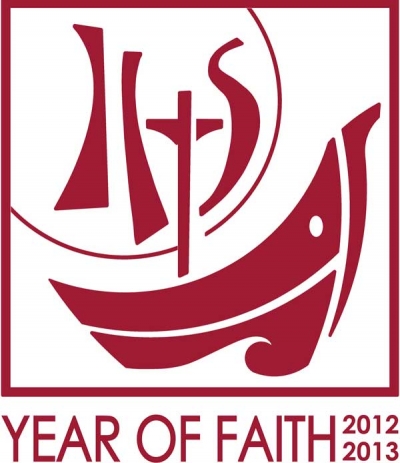
 The following is the longer version of the vital prayer composed by Pope Leo XIII in 1888 after his startling vision as to the future of the Church. This prayer was dedicated for the Feast of St. Michael 1448 years from the date of the election of the first Leo - Pope Saint Leo the Great. Everyone is familiar with the first prayer below which was mandated by His Holiness as part of the Leonine Prayers after Low Mass. Below are both the short and longer versions of this poignant prayer which should never be forgotten.
The following is the longer version of the vital prayer composed by Pope Leo XIII in 1888 after his startling vision as to the future of the Church. This prayer was dedicated for the Feast of St. Michael 1448 years from the date of the election of the first Leo - Pope Saint Leo the Great. Everyone is familiar with the first prayer below which was mandated by His Holiness as part of the Leonine Prayers after Low Mass. Below are both the short and longer versions of this poignant prayer which should never be forgotten. 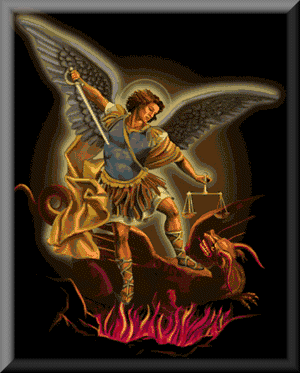
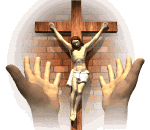 Look down upon me, O good and gentle Jesus, while before Thy face I humbly kneel, and with burning soul pray and beseech Thee to fix deep in my heart lively sentiments of faith, hope and charity, true contrition for my sins, and a firm purpose of amendment; the while I contemplate with great love and tender pity Thy five most precious wounds, pondering over them within me, calling to mind the words which David Thy prophet said of Thee, my good Jesus: "They have pierced My hands and My feet; they have numbered all My bones."
Look down upon me, O good and gentle Jesus, while before Thy face I humbly kneel, and with burning soul pray and beseech Thee to fix deep in my heart lively sentiments of faith, hope and charity, true contrition for my sins, and a firm purpose of amendment; the while I contemplate with great love and tender pity Thy five most precious wounds, pondering over them within me, calling to mind the words which David Thy prophet said of Thee, my good Jesus: "They have pierced My hands and My feet; they have numbered all My bones." 

